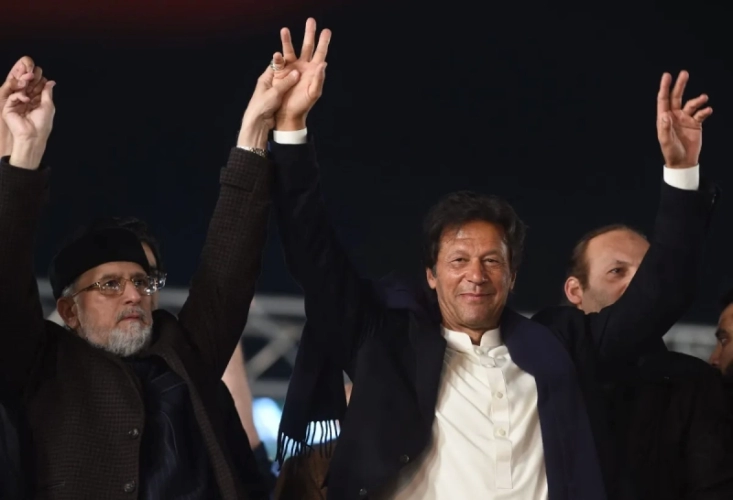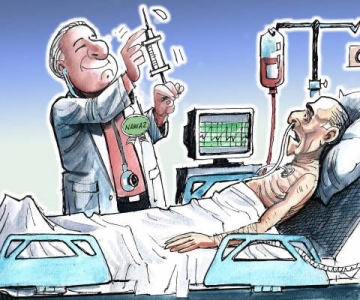Pakistan’s electoral system is far from perfect. Like most other state functions, electoral laws and practices need to be reformed. In a democracy, this is to be undertaken by the legislature and through a multiparty consensus. The allegations of rigging since May 2013 are all too familiar. The Pakistan Tehreek-e-Insaf (PTI), which garnered 19 per cent of the total votes(and fewer seats in the National Assembly) has been crying foul of massive rigging. Now exactly after a year of elections, and quite cynically exercising power in Khyber-Pakhtunkhwa (K-P), the party is launching a protest through a sit-in in Islamabad. Concurrently, another self-styled reformer, Dr Tahirul Qadri, is also launching a protest against the system. We all have serious reservations about the system but the alternative provided by Dr Qadri is vague as well as populist.
These two protests come in the wake of recent tensions between the civilians and the military. Given Pakistan’s history, the PTI’s protest and the return of Dr Qadri from the safe environs of Canada are termed being sponsored. It is difficult to ascertain the veracity of this perception. However, the timing of these protests against the credibility of a parliament of which the PTI and its leader, Imran Khan, are part of is somewhat problematic. This time the responsibility of rigging is being termed a collusive project of the ruling PML-N, the judiciary and the largest television network, ie, Geo Tv.
The timing of PTI’s protests raises several questions. In the first place, why wait a year to challenge the election results? Why form a government in a province, become part of the assemblies, and then choose the street agitation route? Most importantly, despite the lapse of a year, substantive proposals were submitted in the National Assembly by the PTI to improve and fix the electoral system? It becomes even more intriguing that one agitated party is challenging the legitimacy of last year’s election results while the other, led by Dr Qadri, is questioning the rationale to have a parliamentary democracy itself.
Making matters more complicated, there is little or no interest by the PTI, as the second largest political party, to scrutinise the performance of the PML-N’s one year in office. Imran Khan and his party are also not offering any idea of how well they have performed in K-P compared to, say, the PML-N or the PPP. Take the case of local government elections, which according to the PTI’s manifesto, were supposed to take place within 90 days of assuming power. How has the PTI behaved any differently from the PPP or the PML-N by delaying these elections when it has used the rhetoric of local service delivery, justice at the doorstep and anti-corruption reform time and again?
These questions lead to the skepticism over the method and timing of the protests. While the PTI cadres are all excited about another show of force in Islamabad, others are worried what this political instability means for the country. The civil and military pillars of the power matrix don’t appear to be comfortable with each other. Media freedoms are under attack. Pakistan is inching towards a pariah state due to the growing cases of poliovirus and the alarming statements of the World Health Organisation that Pakistanis would need vaccination before travelling abroad. Terrorism has not vanished nor has the insecurity among the public.
This behaviour by the political elite is not too surprising either. We are quick to blame the military for its interventions in politics and for its perennial engineering of the political system. But should the politicians not answer for their apparent lack of interest in the democratic project? What has stopped the PML-N to open parleys with its foe the PTI and attempt a negotiated settlement? And why is Imran Khan not learning anything from our history where such confrontations create even more space for the third force to intervene?
The PTI’s strategy to mount pressure on the courts is also a result of populism that has influenced the notion of justice in Pakistan. The last few years have witnessed courts responding to, or engaging with, the media and taking up causes to placate the public opinion. A few judgments have also stated that expectations of the people are a factor in adjudication. This has created an opening and the PTI is only using that lever. Of course, this is not what the courts may wish to and should not deal with.
Hypothetically, the success of Dr Qadri’s mission would be the end of the current system of parliamentary democracy. Is that what Imran Khan wants? Definitely not. So this may be a calculated risk to augment pressure on the Nawaz government and in the process, endear the segments within the establishment that are annoyed with the government. As a short-term strategy it may work, but it is ultimately going to interrupt or even reverse the democratic transition that commenced in February 2008. Unlike Dr Qadri who has no real systemic stakes, the PTI must chart its course with caution. It should be focusing on the next election and push for electoral reforms and transparent methods of balloting rather than wasting its energies on populist, risky adventures. Neither a midterm election nor a coup d’etat guarantees that the PTI will be in power anytime soon.
My latest column for Express Tribune published under the heading: “Imran Khan, Tahirul Qadri & a dharma”



